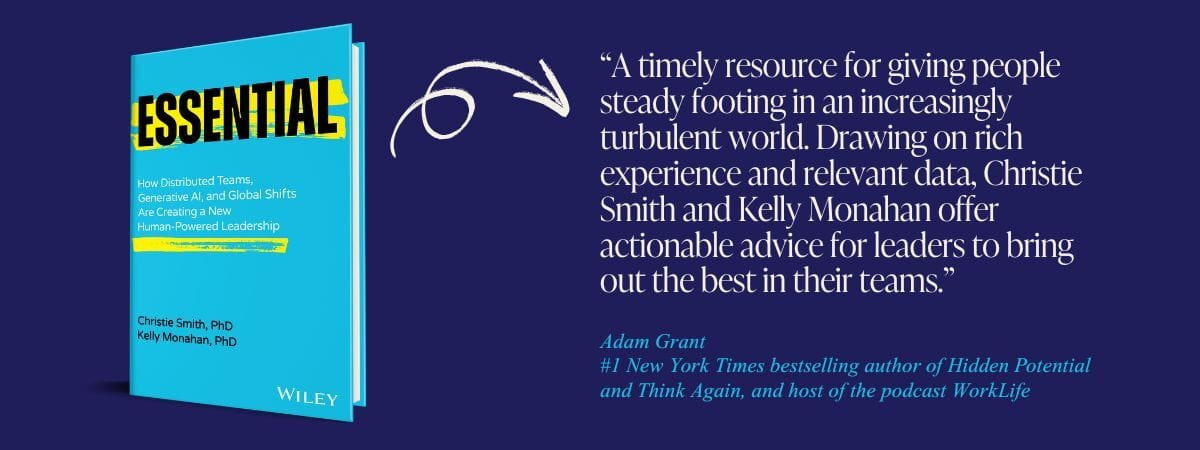- The Humanity Studio
- Posts
- The Year-End Ritual Every Leader Needs
The Year-End Ritual Every Leader Needs
Why self-reflection is the secret to connected leadership.
December is a natural time to pause, reflect, and take stock—not just of what we’ve achieved, but of who we’ve become. For leaders, self-reflection isn’t just a personal exercise; it’s a leadership imperative.
We’ve spent the year navigating a world that demands agility, empathy, and decisiveness. But leadership isn’t only about what you do—it’s about who you are. Self-reflection offers the opportunity to reconnect with your purpose, realign your actions with your values, and recalibrate for the road ahead.
In the words of leadership expert John Maxwell: “Experience isn’t the best teacher. Evaluated experience is.” By carving out time to reflect, we transform our experiences into lessons—and our lessons into growth.
This month, we’re focusing on self-reflection as the foundation for leadership growth. In this first issue, we’ll explore why self-reflection is a leadership power skill and how you can make it a cornerstone of your leadership practice.
Four Ways Leaders Practice Self-Reflection
Reconnect with your “why”
Why did you choose this path? Revisiting your purpose brings clarity and energy to your leadership. Purpose isn’t static—it evolves. Reflecting on it helps ensure your goals align with your values and what matters most.
Audit if your insides match your outsides
When the pace and pressures of leadership take over, it’s easy to drift from your core values. Take a moment to ask yourself: Do my actions reflect my intentions? Are the decisions I make aligned with what matters most to me? This audit helps ensure integrity between who you are and how you lead.
Ask for feedback
Reflection isn’t just about looking inward; it’s also about seeing yourself through the eyes of others. Ask your team, peers, and mentors: What am I doing well? Where can I grow? Their perspectives are a gift, helping you uncover blind spots and celebrate strengths.
Take a bird’s eye view
Think about the past year: What were your proudest moments? Your toughest challenges? What excited you? What drained you? What patterns do you notice? Recognizing the highs and lows helps you identify themes and growth areas for the future.
10-Minute Takeaway: Write a Leadership Letter
End the year with intention by reflecting on your growth and setting your vision for the year ahead.
Step 1: Write a letter to yourself, starting with: “This year, I am proud of…” List your achievements, the challenges you’ve overcome, and the ways you’ve grown as a leader.
Step 2: Transition to: “In the year ahead, I will…” Set one or two intentions for the leader you want to be in the coming year. Then, identify one or two behaviors, mindsets, or habits you’ll leave behind.
Step 3: Seal the letter and revisit it in December 2025. Let it serve as both a milestone and a reminder of your evolution.
Tip: Pair this exercise with a moment of gratitude for your journey—it’s the perfect way to close one chapter and step into the next with clarity and purpose.
What We’re Reading, Watching, and Listening To
Mental Health Needs More Than Quick Fixes: Fast Company explores why band-aid solutions fall short when it comes to workplace mental health—and what leaders can do to create real, lasting change. Read more here.
Infusing Gratitude Into Your Leadership: This Inc. piece provides five simple strategies to incorporate gratitude into your daily life and leadership practice—making a big impact with small, intentional actions. Read more here.
Reflecting on Professional Relationships: As the year winds down, Harvard Business Review shares why the holiday season is the perfect time to evaluate and strengthen your workplace connections. Read more here.
Repairing Broken Work Relationships: In this thoughtful 13-minute episode, HBR offers actionable advice on how to mend trust and rebuild collaboration when workplace relationships go awry. Listen here.
A Dose of Humanity to Fill Your Cup
Mel Robbins introduces The Let Them Theory—a simple but transformative mindset for releasing expectations and finding peace in your relationships. As leaders (and humans), we often hold others to impossible standards. But when we accept people as they are—imperfect, human, and doing their best—we create space for compassion, connection, and clarity. Just in time for the holidays, Robbins offers a tool to transform not only family dynamics but team relationships as well. Watch her inspiring message here and then grab a copy of her new book The Let Them Theory.
Thank you for being here. Until next week,
The Humanity Studio Team
The Humanity Studio Newsletter is community-supported and ad-free, created by our team to bring you valuable leadership insights. Click here to upgrade to weekly posts—and while you’re at it—share with a friend you think would enjoy it, too. Have questions or topics you’d like us to cover? Reply to this email to reach us directly. We’d love to hear from you!

Reply